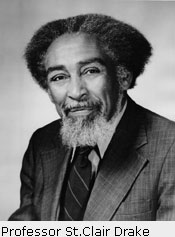|
Craig White's authors |
 |
St. Clair Drake (1911-90) |
 |
St. Clair Drake, Pioneer in Study Of Black Americans, Dies at 79
By Peter B. Flint, New York Times, June 21, 1990
St. Clair Drake, a pioneer in black
studies who was the first permanent director of
Dr. Drake, a professor emeritus of sociology and
anthropology at Stanford, was an early researcher on black Americans. His works
included Black Metropolis: A Study of Negro Life in a
The 830-page book,
published by Harcourt, Brace, chronicled thousands of incidents, attitudes and
anecdotes in interviews with hundreds of Bronzeville residents. The volume was
hailed by reviewers as a landmark of objective research and one of the best
urban studies produced by American scholarship.
A Model Study
Program
In 1969, Dr. Drake
went to Stanford to lead one of the most successful and imitated black-studies
programs in the country at a time of campus protests over creation of such
centers.
![]()
Fred M. Hechinger,
a former education editor of The New York Times, wrote in the Times Magazine of
April 13, 1980, that Stanford's success was largely the result of its refusal to
allow radical politics to gain the upper hand over academic integrity.
In a nearly 60-year career, Dr. Drake
also taught at
Adviser to African
Leaders
Dr. Drake had been a close adviser to
the leaders of several newly independent African countries, including Prime
Minister Kwame Nkrumah of
John Gibbs St. Clair Drake was born on
Jan. 2, 1911, in
He graduated with
honors in biology from Hampton Institute. His reading included works by black
militants and he joined Quaker activists traveling around the country in a
campaign for world peace.
'Just Missed the
Lynching Rope'
His efforts prompted racist insults by whites. Several
times he ''just missed the lynching rope,'' he recalled, and he became dedicated
to racial justice. He aided black tenant farmers and, on a fellowship, earned a
doctoral degree in anthropology at the
Dr. Drake was a founder of the
American Society for African Culture and of the American Negro Leadership
Conference on
Survivors include
his wife, the former Elizabeth Dewey Johns; a daughter, Dr. Sandra Drake, of
Palo Alto, who is an associate professor of English at Stanford, and a son,
Karl, of Poughkeepsie, N.Y.
